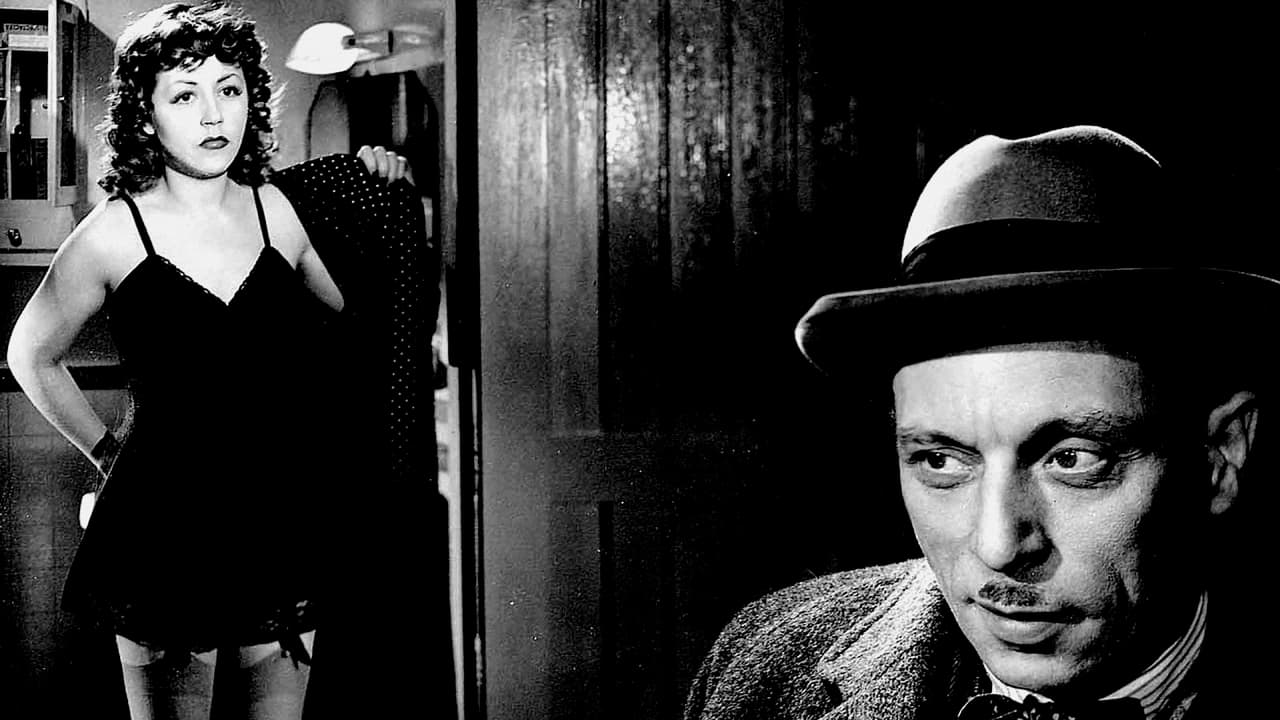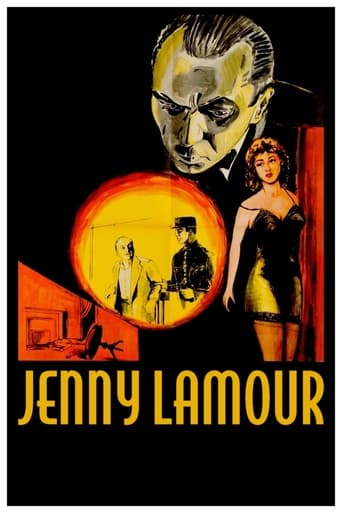Gurlyndrobb
While it doesn't offer any answers, it both thrills and makes you think.
Bergorks
If you like to be scared, if you like to laugh, and if you like to learn a thing or two at the movies, this absolutely cannot be missed.
Patience Watson
One of those movie experiences that is so good it makes you realize you've been grading everything else on a curve.
Ella-May O'Brien
Each character in this movie — down to the smallest one — is an individual rather than a type, prone to spontaneous changes of mood and sometimes amusing outbursts of pettiness or ill humor.
treywillwest
Satisfying bit of post-war French existentialism. Clearly informed by American Noir, the universe of this film is, however, a very different one than that of the American films.
The society of American Noir is one in which the old, patriarchal values have been eroded by the absence of men during the war. Women have become independent, and therefor dangerous, leading the traumatized former soldiers astray into darkness. The downfall of such characters in most Noir is the reinstatement of order, or at least of justice. Perhaps the world is no longer one that deserves happiness, but it will not be a place where transgression is rewarded.
The characters in this French film engage in many illegal, dangerous activities. Yet the film does not feel the need to moralize about them. Indeed, neither does law enforcement, which is depicted here as simply another weary faction of the working class. This is a cosmos that is neither punitive nor loving but simply, in Camus's phrase, "gently indifferent."
Terrell-4
Is it a murder mystery? Is it a police procedural? Is it a back-stage look at seedy French music halls? Quai des Orfevres is all of these, but more than anything else it's an amusing comedy of infidelity, jealousy and love, set in post-WWII Paris. It may be surprising that Henri- Georges Clouzot, the director of such grim films as Le Corbeau or such suspenseful nail- biters as Diabolique and The Wages of Fear, is the director of this one. Clouzot, however, was a shrewd film-maker. "In a murder mystery," he tells us, 'there's an element of playfulness. It's never totally realistic. In this I share Hitchcock's view, which says, 'A murder mystery is a slice of cake with raisins and candied fruit, and if you deny yourself this, you might as well film a documentary.'" Quai des Orfevres is a wonderful film, and it's no documentary. Jenny Martineau (Suzy Delair) is an ambitious singer at music halls and supper clubs. She's a flirt, she's sees nothing too wrong with using a bit of sex as well as talent to get a contract. Her stage name is Jenny Latour. And she really loves her husband, Maurice Martineau (Bernard Blier). Martineau is something of a sad sack. He's her accompanist and arranger. He's a bit balding, a bit chubby and jealous to a fault. Then we have their neighbor, the photographer Dora Monnier (Simone Renant). She's blond, gorgeous (think of Rita Hayworth) and capable. She and Martineau have been friends since they were children together. Dora, however, is definitely not thinking just of friendship when she looks at Jenny. Then comes along Georges Brignon (Charles Dullin), a wizened, rich and dirty old man, who often has Dora take "art" photographs of his young female proteges whom he poses himself. He offers a contract for a film to Jenny, and suggests a dinner at his home to discuss the details. Jenny is more than willing. Maurice is furious and forbids it. Jenny shouts right back at him, "You're jealous of the rich! Well, I want my share of their dough. I'm all for royalty!" "You're dad was a laborer," Maurice shouts back. "So what? Under Louis XV, I'd have been Madame de Pompadour! I'd have heated up their tights!" And after Brignon is found dead with a smashed champagne bottle next to his bleeding skull, there's Dora to try to make things safe for Jenny. But wait. Inspector Antoine gets the case. Antoine (Louis Jouvet) is a tall, tired, middle-aged bachelor with sore feet. He has seen it all. He served in "the colonies" with the Foreign Legion and returned with an adopted baby and malaria. The child is now about eight-years old and Antoine dotes on him. One of the first things Antoine discovers is not only did someone brain Brignon with a bottle, someone shot him in the heart. Who did it? Before long Jenny, Maurice and Dora all are making up alibis, lying and, at one or another point, confessing. How will Antoine discover the murderer? Will we have a chance to see some great music hall songs sung by Jenny Latour? Everything becomes clear, but only with time and Detective Antoine's persistence. We are left with many kinds of love leading to all kinds of motives, from hair-trigger jealousy to longing glances...and all played with a nice mixture of Gallic amusement. Clouzot takes us to a Paris of seedy but not threatening neighborhoods, to downtrodden music publishers where tunes are played on the piano for buyers, to restaurants with discrete private dining rooms. Most of all, he takes us to the music hall where Jenny Latour often performs. We can see Jenny as she sings, with couples in the seats and single men wearing their coats and hats in standing room. And everyone smokes. The first third of the film, in fact, takes place largely in this milieu. With Jenny singing about "Her petite tra-la-la, her sweet tra-la-la," we follow her from trying out the song at the publishers to a rehearsal to a saucy performance with Jenny in a feathered hat, a corset, gartered stockings and not much else. Delair, Blier and Renant all do wonderful jobs, but it Louis Jouvet who holds everything together. He was a marvelous actor who disliked making films. The stage was his world, and he took on films only if he happened to like the director and to make money to finance his stage work. Jouvet was tall with a long face and broad cheekbones. He was not conventionally handsome but he had what it takes to dominate a scene. For a look at how skillfully he could play comedy, watch him in Drole de Drame. He's a fascinating actor. At one point he says, "I've taken a liking to you, Miss Dora Monnier." "Me?" she asks. "Yes. Because you and I are two of a kind. When it comes to women, we'll never have a chance." Jouvet brings all kinds of nuances to that line, from rueful regret to a gentle amusement.
writers_reign
Clouzot followed Le Corbeau, where no one knew who was penning the poison thus everyone was suspected, with another masterpiece, Quai des Orfevres four years later in which we know from the outset (or think we do) whodunnit. Top-billed Louis Jouvet doesn't appear for forty minutes by which time Clouzot has established a rich milieu of Music Hall, music publishers, etc and a fine cast of colourful characters; Angela Lansbury lookalike (Lansbury appeared in Woman of Paris that same year) Suzy Delair scores as the chanteuse whose desire to improve her lot inspires the jealousy of her husband/accompanist Bernard Blier who follows her to the home of an elderly letch only to find he is already dead. From here things go seriously wrong, his car is stolen before he leaves the premises so his pre-arranged alibi is out the window whilst meanwhile, unknown to him, his wife confesses to the murder to the photographer neighbour, a closet lesbian in love with her, who volunteers to return to the crime scene and retrieve Delair's scarf and as long as she's there,thoughtfully wipes her prints of the murder weapon, a champagne bottle. At this point investigator Jouvet gets involved and from then on it's a case of keeping the plates spinning in the air. Clouzot's output was relatively small but virtually all of it was, as Spencer Tracey said in another context, 'cherce', with Le Salaire de peur and Les Diaboliques still to come. In short this is a must for French cinema buffs.
heliotropetwo
The Director loves the actress and it shows. The actress inhabits the character, whom we love at first sight and sound. The character loves her jealous unprepossessing husband and he loves her. His childhood friend secretly loves his wife and the fact that his friend is a beautiful woman makes the love tragic and ironic. His wife is jealous of his childhood friend and thinks her attentions are out of secret love for her husband.Then there is a murder and the investigating police lieutenant, who loves only his bi-racial son, and resents being taken from his company by the above characters, who have had some unpleasant contact with the deceased and are all lying to one degree or another, unravels the mystery with some of the most precise and authentic procedural detail ever captured on film.And then there are the atmospherics of a post-war Paris, where coal is in short supply, music is filled with erotic longing and wistful memory, and innocence has long ago been washed away by the rain.All of this in a milieu of magicians whose tricks don't always work, dogs who walk on their hind feet and express music criticism, hungry news reporters and exhausted cops.And then there are many of the finest actors of their generation who have been through some very bad years directed by, to come full circle, a man who is in love with his lead actress and who, with full justification, was a respected friend of Picasso.I've seen this film often and I love all of them and it.

